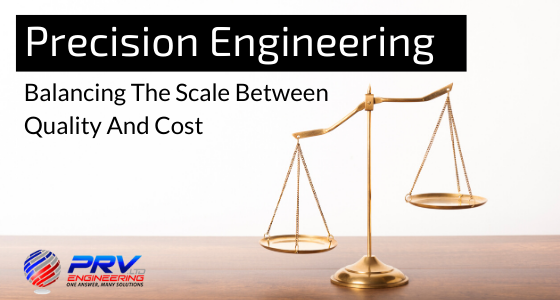Let’s face it, cost versus quality has always been a big talking point, especially in the world of precision engineering. The root of many engineering failures can be attributed to human error but faulty parts play a major role in most sectors. While precision may not be as critical in some industries, it is vital in others especially in aerospace, oil and gas components and medical devices or equipment.
Why Does Quality Matter In Precision Engineering?
It may seem an obvious question but the fact is, we have seen too many engineering disasters in recent years. In most of them, shoddy workmanship, mismanagement and faulty components were the primary culprits.
The fatal crash of Partnair Flight 394 back in 1989 is a prime example as the accident was a direct result of using substandard and counterfeit parts. It serves as a stark reminder that quality certainly trumps cost and that cutting corners can put countless lives at risk. Watch the animated video below to see how the Partnair Flight 394 accident occurred.
Precision Engineering Cost Cutting And Off-Shoring
As any company will tell you, the bottom line is important as good profit margins equal success. However, is it worth the risk by off-shoring?
The cost factor makes sense as workers from emerging economies will work for less and make components at a lower cost. However, while the math is clear, the question is whether you should consider off-shoring. There are a few problems with this approach including:
- Overseas wages today are not as low as they were during the 1990s so off-shoring cannot always guarantee a cheaper outcome
- Off-shoring doesn’t help with CSR and carbon footprints while transit costs can be astronomical which only ends up being way more expensive
- Quality controls may also be lacking in terms of legislation, certification, reviews, and quality standards. While these are features of the UK, US, and EU, it’s not as controlled in other counties
Lower The Risk And Avoid Mistakes
A major contributing factor in off-shoring and low-cost companies is increased risk. Legitimate companies typically have good management and manufacturing processes in place. Together, they can calculate and balance risk and uncertainty. While risk is measurable, uncertainty is not and that’s something precision engineering companies would prefer to avoid.
Working with a legitimate precision engineering or manufacturing company gives you a certain confidence and peace of mind knowing your project will be successful and safe for use. These companies usually offer much higher levels of quality control which is invaluable when reducing risk and minimising uncertainty.
Recommended: ‘Why Quality Fabrication Matters’
Focus On The Long-Term
Considering that the precision engineering environment depends so heavily on quality, companies need to buy into the long-term plan. While many may not like making big commitments, research has shown that a business built on a strong foundation of quality is essential.
Not only does the industry require it but consumers demand it and for good reason. Once more we look at another aviation catastrophe in the Boeing 737 Max. This scandal is a perfect, yet unfortunate, case and point of what happens when flirting too closely with cost over quality.
Recommended: ‘Quality Engineering: Is Good Quality More Expensive’
What Is The Cost Of Good Quality?
The cost of good quality can be broken down into two major sections – Prevention and Appraisal.
Prevention costs are activities that aim at limiting variation that does not meet the customer’s expectations. Any modern quality management system and developing control plans are good examples.
Appraisals which involve properly calibrated equipment or auditing the quality management system are sources of “good” quality costs. While there are numerous processes to aid in preventing defects or “failure,” we’ve listed a few in the list below:
Prevention
- Error Proofing
- Capability Assessments
- Training
- Design Review
Appraisals
- Quality Auditing
- Inspection/Testing
- Calibrating Equipment
- Supplier Assessment
Full article available here: ‘Calculating Cost Quality’
PRV Guarantees Precision Engineering Quality
At PRV, all products and services are provided in accordance with the Quality Standards BS EN ISO 9001:2008 and BS EN 1090 – EXC3. This covers the following activities:
- General and Precision Engineering producing Machined Components and Turned Parts
- Wet Spray Painting
- Powder Coating
- Steel Fabrication
- Installation and Maintenance
- Structural & Architectural Steelwork
If you want expert, reliable and effective CNC machining services, look no further than PRV Engineering. They have been a globally trusted Precision Machine Shop for more than 20 years and have made the “One-stop Shop” concept their own.
Conclusion
In precision engineering, cutting corners can quickly result in a disastrous situation leaving chaos and loss of life in its wake. Engineering companies should ask themselves whether saving some money is worth being responsible for fatal accidents caused by human error or cheap, faulty components.
At the same time, customers who require precision engineering work should not take this lightly either. If you want to make money without cost-cutting while keeping your reputation intact, make better products by choosing to work with legitimate engineering companies.
If you liked this article and have something valuable or interesting to share, please comment in the section below. Contact PRV via the website if you have any questions about their wide range of precision engineering and custom fabrication services.
For all the latest in engineering, fabrication and technology, join the conversation on social media using the hashtag, #PRVtech, and please follow the blog.


Recent Comments